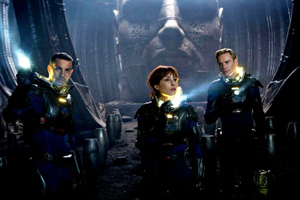Warwick researchers on new Ridley Scott film Prometheus
The new Ridley Scott film Prometheus is released in cinemas today (1 June), three experts from the University of Warwick give their views on the film’s themes, the myth of Prometheus and whether the aliens will actually look like aliens
 Dr Nicolas Pillai, researcher at the University of Warwick’s Film and Television Studies department
Dr Nicolas Pillai, researcher at the University of Warwick’s Film and Television Studies department
Contact: 07880 655 835 or nicolas.pillai@gmail.com
“While its trailers promise spectacular special effects, Prometheus follows a very traditional science-fiction narrative pattern. Archaeologists with conflicting agendas unearth a Pandora's Box - the curse of Tutankhamun by way of 2001: A Space Odyssey (1968) and Erich von Däniken.
It also promises to excavate the past glories of director Ridley Scott. Initially conceived as a direct prequel to his Alien (1979), the project has mutated into something more interesting, riffing at the level of production design and tone rather than plot. Given this allusional approach to personal history, it seems important that Scott's protagonist is British (despite being played by Swedish Noomi Rapace). Raised in Teesside, Scott was a young BBC designer in the early days of Doctor Who and narrowly missed the chance to design the Daleks. By calling Rapace's character Dr. Elizabeth Shaw (also the name of a Doctor Who companion in 1970), the screenwriters slyly reference a road not taken in Scott's past.
Prometheus' success may lie in its acceptance of diverse influences. While previous prequels have been restricted by an inevitable narrative end point, Scott's new film draws upon a wealth of transmedia artifacts - philosophical tracts, Egyptology, a 1967 Doctor Who serial called Tomb of the Cybermen and the current thirst for TEDtalks.”
Dr Jack Cohen, Honorary Professor of the University of Warwick, and one of the joint authors of “Evolving the Alien: The Science of Extraterrestrial Life”.
Contact: 01929 480377
“The Alien universe, which Prometheus may also be part of, at least avoids the more preposterous fictional universes where most of the aliens look exactly like humans – but with slightly different types of bumpy foreheads. Aliens are likely to be much more alien. However the key aliens of the Alien universe still draw too much on human’s own fear images and this obscures more reasoned speculation what real aliens may look like. The life cycle of this particular fictional race of aliens also builds on those human fear responses to produce movies that are brilliant at exploiting our fears for fun but which are also filled with scientific impossibilities. We still just can’t resist making our movie aliens all too human.”
Dr Angie Hobbs, Senior Fellow in the Public Understanding of Philosophy
Contact: 07969 487755
“In Greek mythology Prometheus represents human foresight and forethought, resourcefulness and initiative; he also stands, more ambivalently, for trickery and human ambition, if needs be in defiance of the gods. In Aeschylus' (or Pseudo-Aeschylus') Prometheus Bound and Plato's Protagoras, he is shown stealing fire from Hephaistus and arts and skills from Athene for the benefit of mankind, and being horrifically punished by Zeus for his effrontery. His unquenchable rage against Zeus in Prometheus Bound has inspired artists ever since.
But in other versions of the myth we see Zeus ultimately forgiving Prometheus when Prometheus' prophetic gifts are also of service to him. No character better exemplifies the human desire to test and extend the limits of humanity, or the complex interdependency between mortal and divine beings in Greek thought.”
Notes to editors For more information please contact Kelly Parkes-Harrison, Press and Communications Manager, University of Warwick, k.e.parkes@warwick.ac.uk, 02476 150868, 07824 540863
